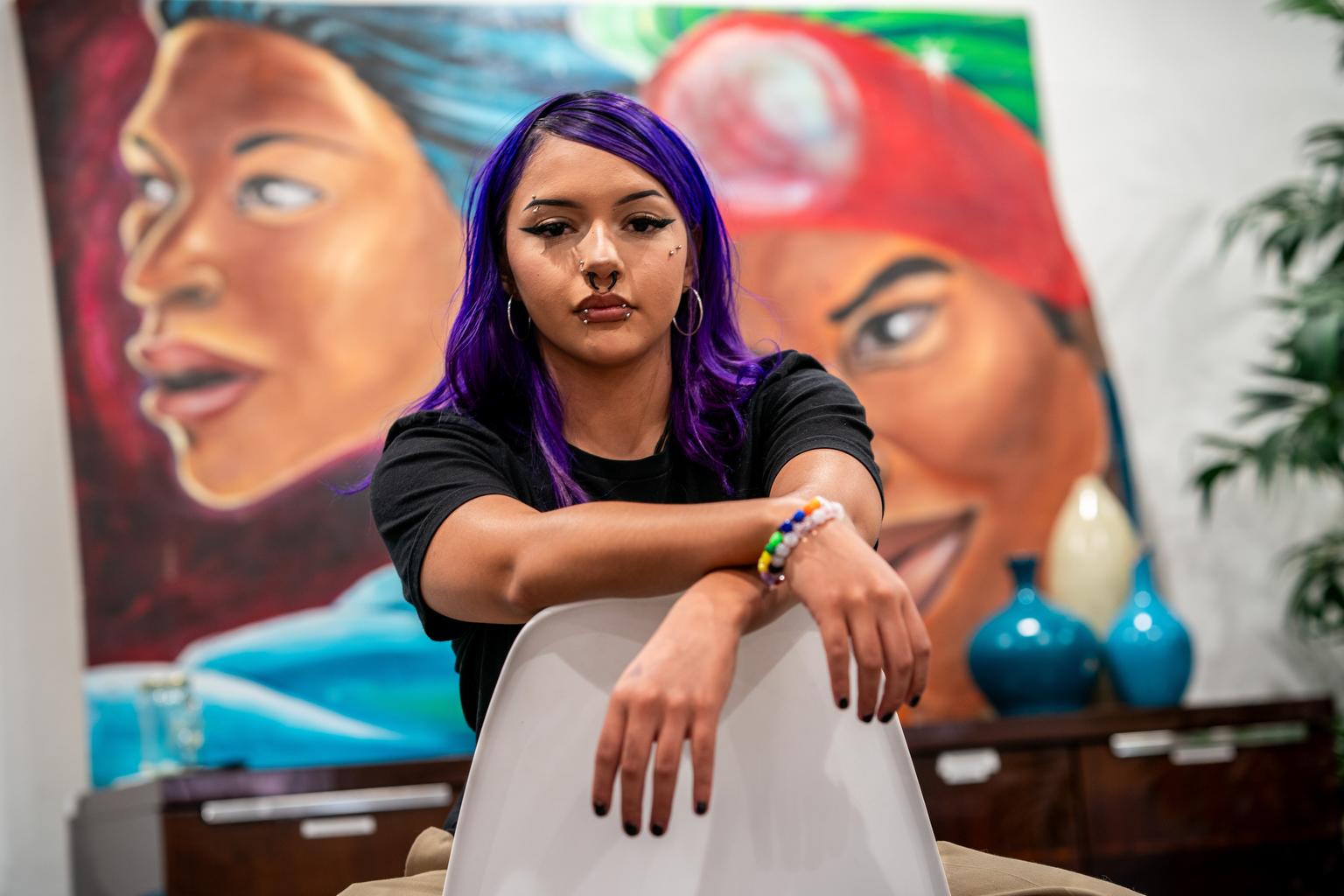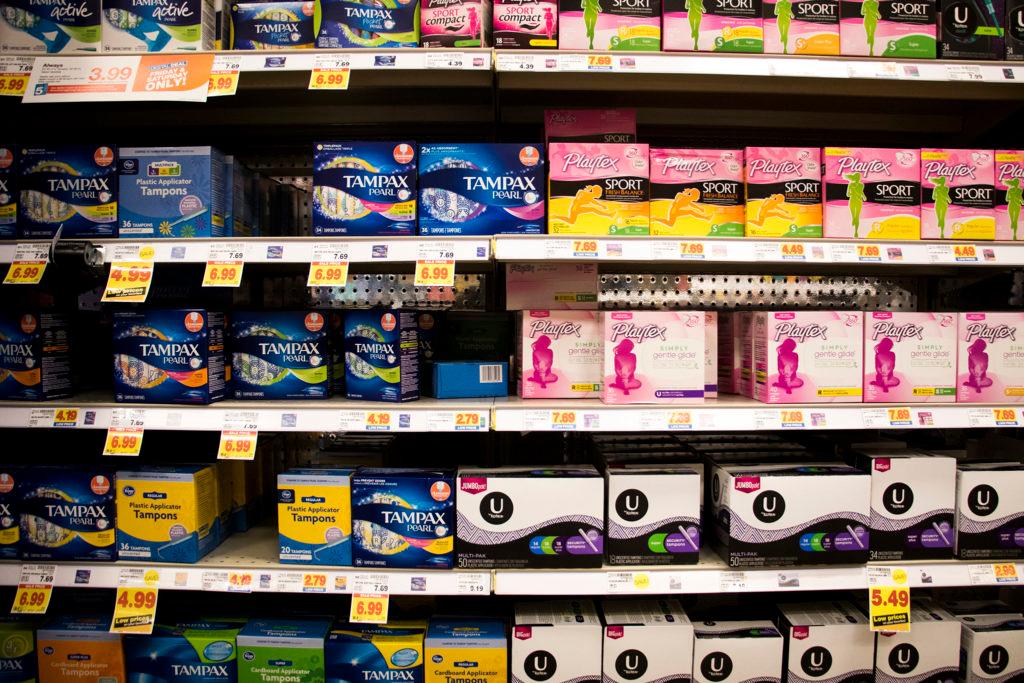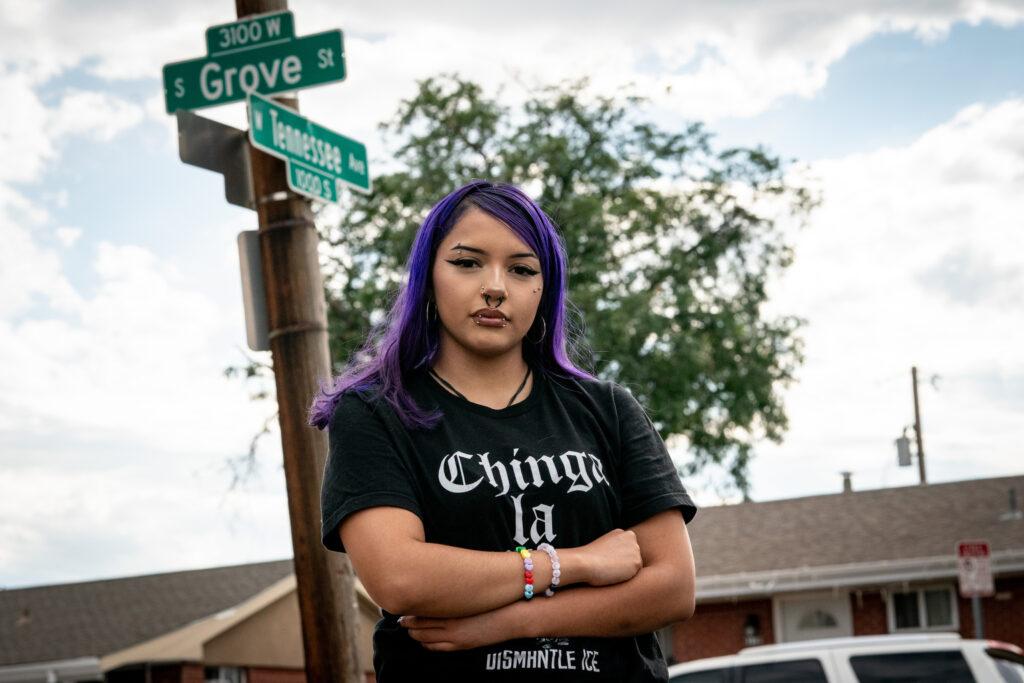
Angeli Cazares is a 17-year-old who likes being outdoors in nature, wearing her hair with purple highlights, and going to skate parks. A gifted and talented student, she graduated in three years from Denver North High School.
Besides the accelerated pace at which she could study, another good thing about high school was that when she went into the bathroom, she found a dispenser stocked with feminine hygiene products.
“They started offering it in like mid-2021, and then when I had started attending in 2022, they already had them in all of the restrooms, which was an amazing help, honestly,” Cazares said. “A lot of the times my period is extremely irregular, so I mostly get it without knowing or without any kind of heads-up … One time I got it randomly at school and I was in so much distress, I was super anxious. I did not want to ask anybody just out of that self-conscious embarrassment. And so I went to the restroom and I saw them there and I was extremely relieved.”
Her school is one of a few dozen schools and school districts in Colorado that’s already in the process of introducing free sanitary pads and tampons in girls’ and gender-neutral restrooms in middle and high schools. The state joins nine others around the country.
The angst about whether to go to school and risk an accident, the worry of having to choose between buying school lunch and the products that allow students to participate in after-school sports and activities are not going to be deterrents for her or other students in Colorado much longer.
This June, Gov. Polis signed into law HB24-1164, The Free Menstrual Products to Students measure. It requires that schools offer period products, for free, in their bathrooms. Some schools, like Cazares’, had recently begun offering products, while other schools in Colorado will begin doing so in the coming months and years. By 2025, a quarter of all schools are supposed to have them; all schools will be required to in 2028.
A separate bill has offered some funding that schools can use to purchase the period products.
Besides Colorado, nine other states have both a requirement and funding dollars available to place the free period products in schools, according to the non-profit organization Alliance for Period Supplies. They are California, Connecticut, Hawaii, Maryland, Minnesota, New Jersey, New Mexico, Ohio and Oregon.
In Colorado, there’s some funding for the implementation of the new law: During the 2022–2023 academic year, the Menstrual Hygiene Products Accessibility Grant Program gave schools with high numbers of students who qualify for free or reduced lunch up to $4,200 to carry the products, according to a Colorado Department of Education report.
Nebraska is also piloting a program for the 2025-26 school year, while other states require period products in schools, without helping out with the money to supply them, including Delaware, Illinois, New Hampshire, New York, Nevada, Rhode Island, Utah, Vermont, Virginia and Washington, as well as the District of Columbia.

Access to hygiene products has become the keystone issue of the nonprofit organization Justice Necessary, dedicated to combating what its founder Diane Cushman Neal calls hygiene poverty – the inability to afford or access everyday hygiene products. She spent hours lobbying state lawmaker Rep. Brianna Titone, getting informed about the issue, commissioning a study, and sometimes spending 50 hours a week bringing energy and attention to the issue, which she turned into a seven-day-a-week job during the pandemic. Titone was among four women in the state legislature who sponsored the bill requiring the products in schools that eventually became law.
“I really believe strongly that we must provide hygiene products so that we can watch [those around us] become their best selves,” Cushman Neal said. “That’s how they’re going to have a job; that’s how they're going to go to school. That’s how they’re going to have a fulfilling life.”
Numerous studies (including a few by Justice Necessary in 2022 and 2024 with small sample sizes — as well as larger ones) found that period poverty is common; the age of the first onset of one’s period is decreasing, that people miss out on experiences when they lack the sanitary products they need, and that people of color are getting their periods earlier than their adolescent peers, requiring them to need period products sooner.
An online 2021 study done with 1,000 menstruating students between the ages of 13 and 19 called “State of The Period 2021: The Widespread Impact of Period Poverty on U.S. Students,” revealed that almost a quarter of Latinx students had to choose between buying clothing and food, and that almost half of Black and Latinx students feel they are not able to do their best school work because of lack of access to period products. That’s compared to 28 percent among white students.
The law has been met mainly favorably. The International Sanitary Supply Association said in a statement that it “recognizes and continuously advocates for public policies that lead to free access for menstrual products in schools.”
But not all organizations are in favor of the new law. The Colorado Rural Schools Alliance is one of the few expressing opposition to the new law. In a statement, Executive Director Michelle Murphy said it opposed the bill “because rural districts and schools are already providing free menstrual products to students and we were concerned that the bill creates unfunded mandates that would drain rural districts’ resources with regard to both financial and human capital.”
Cazares, the student advocate, said the period products allow her to have one less worry as she decides what to do now that she’s graduated from high school.
She will be studying at the Community College of Aurora; from there her goal is to transfer to the University of Northern Colorado to get a bachelor’s degree in political science with a minor in Chicano studies, and maybe one day do advocacy work around an issue, as she and her friends did with this one.
“A lot of my peers were the ones at the front of being more advocates, so they were more on the media side of stuff, and I was more kind of just in the background, but supporting them and their ideas and their perspectives was my part of the advocacy in this,” Cazares said.

Before she went to Denver North, she attended Denver Montessori Junior/Senior High School, where period supplies were not provided. “I had to rely on bringing them myself or even the teachers provided them for us, but that was out of their pocket, which it shouldn't have been.”
Some of her friends weren’t as fortunate. “A lot of the people I used to go to school with that attend different high schools now, they were always in such stress and anxiety of having to seek out their own products or a lot of my friends were low income, so they couldn't afford the period products or they didn't know what to use.”
Once she got to Denver North, going into the bathroom to get a period product was easy. “They’re on a shelf, kind of like the ones you’d pay for in the public restrooms, but they're free,” she said, adding that the dispenser is made of clear plastic and appeared to hold about 100 products. “You would take one out of the opening and the next one would fall out .… There was one side with tampons and the other with just sanitary pads.”
Cazares said she is eager to watch the program get adopted by other schools and school districts.
In 2026, half the schools in Colorado should be offering period products, and by June 30, 2028, all local education providers will be required to do so, a time Cazares looks forward to.
“I hope other girls get to experience this kind of relief,” she said.









